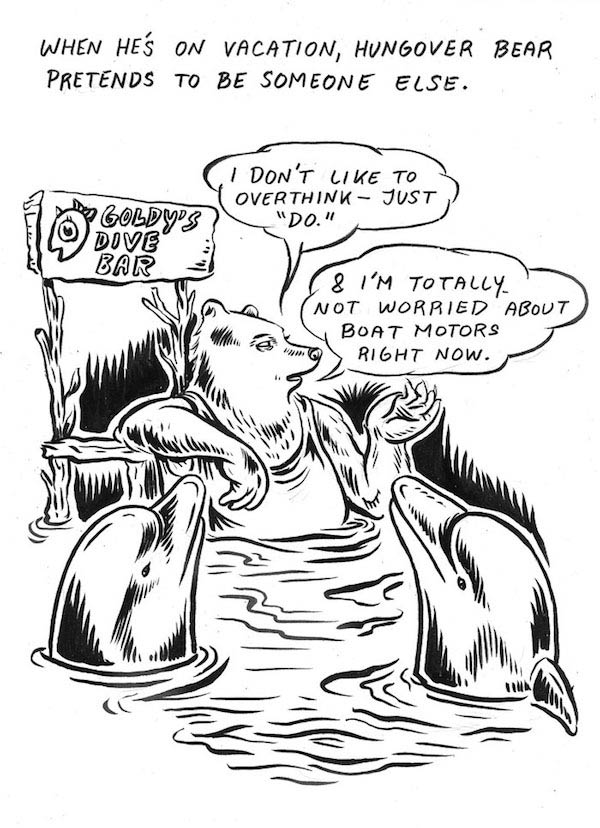Ali Fitzgerald is an American artist and writer, based in Berlin, Germany. Her comics, writings and visual essays have appeared in the New York Times, The Guardian, The New Yorker and Art21, among other publications. Recurring elements in Fitzgerald's work are social issues like migration and politics, as well as animals and how they communicate. Regular features have been the fiction webcomics 'Hungover Bear and Friends' (McSweeney's, 2013-2016) and 'Bermuda Square' (The Cut, 2016-2017), and satirical comic strips for The New Yorker ('America!'). With her debut graphic novel 'Drawn to Berlin: Comic Workshops in Refugee Shelters and Other Stories from a New Europe' (Fantagraphics, 2018), Ali Fitzgerald gave a cross-genre account of immigration and bohemia in Berlin. It tells various stories of comic workshops conducted in refugee shelters, while exploring Berlin's past through the narration of the journalist Joseph Roth.
Early life
Ali Fitzgerald was born in 1983 in Oakland, California. As a child, she loved to read and draw comics; particularly Bill Watterson's 'Calvin and Hobbes' and Gary Larson's 'The Far Side' contributed greatly to her artistic worldview. Later in life, she found inspiration from graphic novelists that push the boundaries of the medium, such as Jillian Tamaki and Emil Ferris. Aesthetically, her influences are woodcuts and artists like Käthe Kollwitz and Lynd Ward.
By the time Fitzgerald studied art and creative writing at Davidson College in North Carolina (2000-2004), she was drawing regularly for the college newspaper, The Davidsonian. She later had a residency at Skowhegan School of Painting and Sculpture, and then attended the University of Texas (2004-2007), where she got an MFA in painting. By the time she graduated, Fitzgerald was busy making paintings and installations. It took a couple of years and a move to Berlin before she returned to comics.
'Hungover Bear and Friends' (mcsweeneys.net, 21 March 2016).
Berlin
Ever since her teenage years, the city of Berlin appealed to Ali Fitzgerald. After reading Christopher Isherwood's novel 'The Berlin Stories', she envisioned the German capital as a bohemian place for queer and political freedom. Moving there in 2009, she began writing about the city for Art21 magazine; including her own 'Queer Berlin' column (2009-2016). To adapt to her new surroundings - and the melancholy that comes with being far from home - Fitzgerald began making comics again; at first only for herself, later also for public consumption.
Comics and visual essays
Early comics by Ali Fitzgerald appeared on the websites of Art21 and The Huffington Post. Between Autumn 2013 and Spring 2016, she had her own bi-weekly comic about "animals and feelings" on the daily humor website McSweeney's, called 'Hungover Bear and Friends'. When that ended, she appeared on New York magazine's The Cut website for women, with a series of illustrated interviews ('The Golden Door') and a surreal comic about animals and queer mermaids called 'Bermuda Square' (Spring 2016 - Autumn 2017).
She additionally had a monthly art-world comic in Art Magazin (2015-2016), and appeared in Bitch Magazine, The Guardian and Greenpeace Magazin. Comic stories by Ali Fitzgerald were also featured in editions of the free comic anthology 'Smoke Signal', published by Desert Island Bookstore in Brooklyn, New York. Since 2016, Ali Fitzgerald has appeared in The New Yorker with comics, visual essays and a recurring satirical comic column called 'America!', humorously exploring social issues like migration and politics. In the Spring of 2018, she began contributing comics regularly to the Book section of The New York Times. Between 2018 and 2020, the Virginia Quarterly Review ran her comic interview column 'Drawing It Out'.
Drawn to Berlin
In the meantime, Fitzgerald exhibited her work throughout the USA and Europe, while giving comic workshops through the Volkshochschule Treptow-Koepenick and at Berlin refugee shelters. There, she was blown away by the people she met and the stories they told. Seeing comics as an outlet for different types of expression, she discovered much of her refugee student's pain and trauma went into these self-made comics. Fitzgerald decided to document her teaching experiences in comic stories of her own, which formed the basis for the graphic novel 'Drawn to Berlin: Comic Workshops in Refugee Shelters and Other Stories from a New Europe' (Fantagraphics, 2018).
In her book, Fitzgerald showed the people and the stories behind the faceless statistics and prejudiced stereotypes. Taking inspiration from the book 'What I Saw: Reports from Berlin 1920-1933' by Weimar Republic reporter Joseph Roth (1894-1939), she also gave a broader perspective to the refugee crisis and its relation to the city of Berlin. Still, she referred to her book as a work of "surreal non-fiction", told from the author's own perspective and sentiments. In that respect, 'Drawn to Berlin' is also a personal journey, in which Fitzgerald explores not only the possibilities of visual language, but also her struggles in how to document other people's stories in an ethical way. A personal document of Berlin at the height of the 2015 European refugee crisis, 'Drawn to Berlin' was first released in English by Fantagraphics; a French edition followed at Presque Lune in 2019.
Living alternately in Berlin and Paris, France, Ali Fitzgerald continues to work for both US and European magazines, making fiction and non-fiction work, both in visual and written form. In addition, she began working on her second graphic novel; an eco-fable set inside a biosphere, where a young girl learns different languages of nature in the search for her parents.
'Museum of Purgatory', visual essay published in The New Yorker in 2021.







